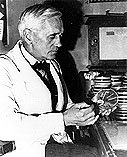 Controlling Bacteria Growth
Controlling Bacteria Growth 
Disinfectant
Antiseptic
Antibiotics
History of Penicillin
Disinfectants
are chemicals that kill microorganisms
and are used on inanimate objects(not safe for your skin).
examples: 409, Lysol, swimming pool
chlorine, bleach
Antiseptics
are chemical agent that kill or slow down the growth of microorganisms
and that are safe to apply to your skin, but are not used inside your body.
examples: Bactine, Hydrogen Peroxide,
Rubbing Alcohol, Iodine
Antibiotics
are chemical substances produced by certain microorganisms that inhibit or
kill other microogranisms. They can be applied to your skin (neosporin) or
taken inside your body (penicillin) They are sometimes categorized as...
Imagine a cluttered, disordered laboratory with
equipment and chemicals scattered around and you have the setting of the discovery
of penicillin. The scienetist who worked in this lab was a man named Alexander
Fleming. Fleming focused on the study of bacteria and was specifically looking
for an antiseptic to treat infections. He used Petri dishes to grow the bacteria
and he was cleaning one day when he noticed mold also growing in a dish. There
was an area around the mold where there was no bacteria. It appeared that
the mold had killed the bacteria. Upon further inspection, Fleming found that
the mold was from the penicillum family.
Eventually Fleming was knighted in 1944. Two
American scientists, Ernst Chain and Howard Florey expanded the penicillin
research. The scientists along with Fleming recieved the Nobel Prize in 1945.
PBS People and Discoveries © 1998
WGBH
![]() Controlling Bacteria Growth
Controlling Bacteria Growth ![]()
